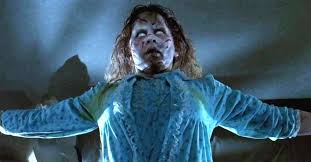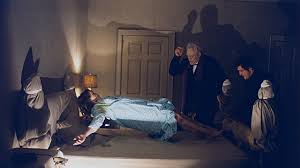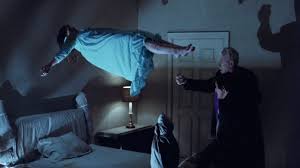🎬 The Exorcist (1973)

Chaos and Chuckles: The Exorcist Unleashes William Friedkin’s Horror Masterpiece
When The Exorcist hit theaters on December 26, 1973, it unleashed a storm of chaos that redefined horror cinema. Directed by William Friedkin and adapted by William Peter Blatty from his 1971 novel, this $12 million Warner Bros. production grossed over $441 million worldwide, becoming a cultural juggernaut. The story begins in Georgetown, where actress Chris MacNeil (Ellen Burstyn) notices her daughter Regan (Linda Blair) acting strange—cursing, convulsing, and defiling a Ouija board. As medical tests fail, two priests—Father Damien Karras (Jason Miller), a doubting Jesuit, and Father Lankester Merrin (Max von Sydow), a seasoned exorcist—step in to battle a demon possessing Regan. What follows is a descent into visceral terror, a clash of faith and evil that still haunts.
Friedkin’s magic lies in his unrelenting chaos. The possession escalates from Regan’s bed-shaking tantrums to head-spinning, bile-spewing defiance—scenes so raw that audiences fainted and theaters handed out barf bags. Shot on location in Georgetown and Iraq (for Merrin’s eerie dig), the film’s realism amplifies its dread. Yet, amid the horror, dark chuckles emerge—Regan’s “Your mother sucks cocks in hell!” is as shocking as it is absurd, a twisted jab from Blatty’s script. Critics hailed it as a masterpiece; Roger Ebert called it “a triumph of atmosphere,” while its 88% Rotten Tomatoes score reflects its enduring power. Adjusted for inflation, it’s one of the top-grossing R-rated films ever—a chaotic milestone born from practical effects and fearless vision.
The pacing builds like a nightmare—slow dread in Chris’s home, explosive terror in the exorcism. Friedkin’s documentary-style grit, paired with Blatty’s theological depth, makes it more than scares; it’s a meditation on belief. For 1973, it was revolutionary—horror that didn’t flinch, with a sprinkle of gallows humor to unsettle further.
The cast is The Exorcist’s tormented soul, each performance fueling its chaotic fire. Linda Blair, just 14, is astonishing as Regan—sweet one moment, a snarling vessel the next. Her physicality—levitating, spider-walking (cut from the original, restored later)—and dubbed snarls by Mercedes McCambridge (uncredited until lawsuits) create a demon both pitiful and petrifying. Ellen Burstyn’s Chris is the frantic heart, her shift from skeptic to desperate mother wrenching—her scream as Regan stabs herself with a crucifix is pure anguish. Burstyn fought for the role, and it shows; her rawness earned an Oscar nod.
Jason Miller’s Karras, a priest wrestling with guilt over his mother’s death, brings quiet turmoil. His “Take me!” plea during the climax is a gut-punch, his sacrifice (tumbling down those Georgetown steps) iconic. Max von Sydow’s Merrin, aged with makeup at 44 to look 70, exudes weary authority—his calm “The power of Christ compels you!” anchors the chaos. Supporting players like Lee J. Cobb’s gruff Lt. Kinderman add levity; his film-buff banter with Karras—“You’re a Jesuit!”—offers a rare chuckle amid the gloom.
Friedkin pushed them hard—slapping Miller for a real reaction, chilling Blair’s set to 30°F—yielding performances that feel lived-in. Critics like Variety praised the “excellent cast,” though some found Blair’s possession more effect than emotion. Still, their interplay—Chris’s pleas, Karras’s doubt, Merrin’s resolve—makes the terror personal, the chaos palpable.
Visually and sonically, The Exorcist is a chaotic assault that burrows under your skin. Owen Roizman’s cinematography turns Georgetown into a claustrophobic trap—crisp autumn streets clash with the MacNeil home’s shadowy corners. The exorcism itself, lit by flickering candles, is a fever dream—Regan’s bed thrashes, green vomit flies, all captured with practical effects (puppetry, pea soup). The Iraq prologue, with its dusty ruins and ominous statue, sets a tone of ancient dread. Friedkin’s cuts are brutal—Regan’s spinal tap, a needle piercing flesh, still horrifies. The Guardian calls it “claustrophobic brilliance,” though some CGI in the 2000 “Version You’ve Never Seen” feels off.
Mike Oldfield’s “Tubular Bells,” used sparingly, became horror’s anthem—its eerie chime a Pavlovian shiver. The sound design—McCambridge’s layered growls, furniture crashes—amps the chaos, while silence (Karras’s mother’s death) cuts deeper. Friedkin rejected a full score, letting raw audio—Regan’s gasps, priests’ chants—carry the weight. Chuckles peek through—Kinderman’s awkward “Othello” chat—but the soundscape’s terror reigns. Flaws? The Iraq bit drags, and some effects (the levitation rig) creak with age. Yet, its visceral power endures, a sonic and visual nightmare that defined a genre.
The Exorcist’s strength is its unflinching chaos—a horror film that dares to disgust and provoke. Blair’s transformation, Burstyn’s despair, and the priests’ battle are indelible; Time dubbed it “spiritually overwhelming.” Blatty’s script, winning an Oscar, blends faith and fear—Karras’s redemption via sacrifice hits hard. The practical effects—Regan’s head turn, crafted by Dick Smith—remain unmatched, per Empire. Chuckles, like the demon’s taunts, sharpen the edge, a dark humor that unnerves. Its 10 Oscar nods (two wins) and cultural scars—banned in parts of the UK—cement its legend.
Weaknesses? The pacing lags early, and Merrin’s backstory feels tacked-on—BBC’s Mark Kermode notes it “assumes audience faith.” Some find the theology heavy-handed, others the shocks dated next to modern gore. Yet, its 122-minute runtime (or 132 in the extended cut) rarely falters; Rolling Stone calls it “perfectly calibrated dread.” Legacy-wise, it birthed a franchise (uneven sequels, a 2023 reboot) and shaped horror—The Conjuring, Hereditary owe it debts. At 9.5/10, it’s a chaotic, chilling triumph—Friedkin’s masterpiece still possesses us, chuckles and all.










